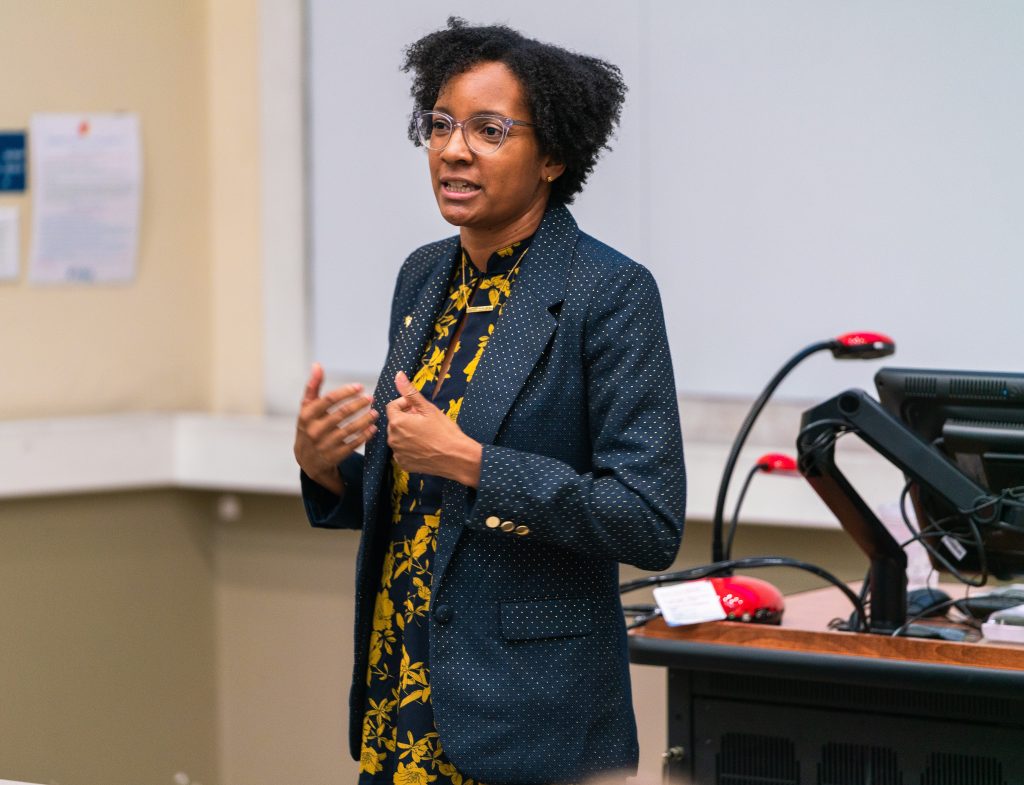Rachel Grant Discusses the Narrative Justice Project
Rachel Grant, University of Florida College of Journalism and Communications Journalism assistant professor, is Research Director for the Narrative Justice Project, a tactical response to popular media conversations around stereotypes and conversations around racism. We interviewed Dr. Grant on Nov. 3, 2021 about the project and findings from the research so far.
Below the video is an edited transcript of the full interview.
Tell us about the Narrative Justice Project.
Grant: So as a result of some of the things that happened in 2019, as well as 2020, the issues with George Floyd and the killings of Breonna Taylor, as well as Ahmaud Arbery, we noticed a conversation that needed to be had around Black Lives Matter, but also how we empower individuals to do narratives that really reflect justice. So for Black and Brown people, the narrative has to really be based in understanding “Can I give back the understanding of humanity?” “Can I move this conversation to actually address real social issues to move social change and to create justice?”
The Narrative Justice Project is a tactical response to popular media conversations around stereotypes and conversations around racism. It’s a partnership Between the University of Florida College of Journalism and Communications and The Wakeman Agency based in New York, I am working with our visiting professor, Vanessa Wakeman, and we are doing trainings mostly. We’ve done them online through Zoom to really address the structural issues of racism, affecting individuals in a media climate.
Who are the trainings for?
Grant: The trainings are for people of color. We’re recruiting Black and Brown individuals in mostly urban climates. We’ve did some interviews with individuals in New York, LA. And so we’ve been really focusing on bigger urban centers across this country.
We did the focus groups for about six weeks over the summer, and most of the particpants were members of the Alliance of Families for Justice. This is a group within New York that is preparing the next group of leaders. And so while they were doing this training, they were also doing community work around voting registration and going into communities and doing things around voting.
Tell us about the nature of your research?
Grant: The research project really focuses on counter stories, as well as creating oppositional knowledge. So scholars who really focus on this are Black feminist scholars who root their understanding of if we can create spaces for lived experiences. Therefore, we can change the narratives and recenter on the actual issues that affect African Americans and Black and Brown people in their daily lives. There’s a 90-minute training that the individuals go through. And then we do a focus group where we have conversations around media and media representations. In those media representations, we tend to address a lot more of the deep everyday struggles, not just so much the impact of these larger issues, but really the everyday oppositional knowledge that has to be created.
What we’ve found so far is that individuals really feel as if their humanity is very much stripped. And when it comes to media interactions, there’s a lot of conflict and confusion from individuals, particularly people of color. They feel like there’s a lack of transparency. And so through the training, we tackle that lack of transparency and issues of trust. How do we create conversations where when individuals are interviewed on a broadcast television, or if they’re being interviewed by a publication or posting on social media, how can they really focus on the mission and the justice that they’re trying to center on instead of falling into some of these media stereotypes?
What we’ve really found in terms of thinking about counter stories is that a lot of people really understand their own experience and really can relate their experience better. They know what the media is looking for, or how media works, or how media functions. And so a lot of the conversations and especially in the focus groups have been about addressing how media impacts, not only people of color, but also just communities overall as a whole. I think we tend to focus on Black and Brown communities as a collective, but we also need to try to uplift and elevate the voices that are very much missing.

Will the research also help mainstream media understand how to better serve these communities?
Grant: There’s conflict in social tensions between media right now in general, and with these communities it’s even more embedded. And I think for journalists and communicators, to understand that, it’s not just about the voice of these people being heard, but really understanding the social historical, economic, political structures that actually exist. And understanding that context in terms of coming to these individuals and asking for these interviews or featuring them, or photographing them or whatever.
It’s more of understanding, can we brace that in some type of context? What we’ve learned so far in this project is that these are communities that understand their struggle. They understand that there’s a place of a status or hierarchy that they exist in, but they’re very aware of the history. And again, that was one thing as well we found out, people were very keen in knowing their own history and knowing what their ancestors had to go through in order to get to these moments of justice and social change.
What’s next for the research?
Grant: As much as this is a journalism and public relations connection, I based this research on public interest communication, which combines those two understandings of journalism being advocacy role, but also in terms of having publics and however you define those publics have empowerment or communication skills as well to create that social change. And I think that makes what this project, again, the partnership, as well as the academic role in terms of the research in looking at communication across different platforms, because we can’t just say that journalism is the problem.
We see conversations in advertising and public relations and media representations and public culture and entertainment media. So I think integrating and converging those things is very key in terms of not only addressing research, but also addressing it in a academic way in terms of our teaching and teaching students about that as well. So that’s my hope
It’s key to not think of academia as just one stop in terms of answering this conversation in terms of research. I think we also need to be able to empower our students, especially students at the College of Journalism and Communications, around how communication really affects the social lives and the political lives and the economical lives of other individuals we cover. So these underrepresented groups need to be integrated within our curriculum, within our teaching and having our students tackle those issues is something particularly within my teaching. And I’m sure within other professors within the college are really trying to emphasize because again, the positionality and the power of journalism as a tool is very key in terms of how we communicate across to our students, but also in terms of how we communicate in terms of how we see individuals or communities as a whole.
Category: Faculty Profiles, Profiles
Tagged: Narrative Justice Project Rachel Grant
Subscribe to our News Digest


